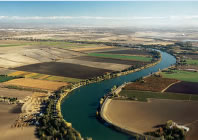 Among the national assessment's key findings, the authors conclude that "efforts to understand the causes of reduced stream health should consider the possible effects of nutrients and pesticides, in addition to modified flows, particularly in agricultural and urban settings," and that "stream health is often reduced due to multiple physical and chemical factors. Understanding how these multiple factors influence biological communities is essential in developing effective management strategies aimed at restoring stream health."
Among the national assessment's key findings, the authors conclude that "efforts to understand the causes of reduced stream health should consider the possible effects of nutrients and pesticides, in addition to modified flows, particularly in agricultural and urban settings," and that "stream health is often reduced due to multiple physical and chemical factors. Understanding how these multiple factors influence biological communities is essential in developing effective management strategies aimed at restoring stream health."According to a USGS release announcing the briefing, the national survey was "unprecedented in the breadth of the measurements that were made—including assessments of the condition of three biological communities (algae, macroinvertebrates and fish) as well as streamflow, pesticides, nutrients and other factors."
The briefing will be moderated by Bill Wilber, Chief of the USGS NAWQA Program, and speakers will include:
- Daren Carlisle, USGS NAWQA Program
- David McKinney, Chief of Environmental Services, Tennessee Wildlife Resources Agency
- Peter Ode, Director, Water Pollution Control Laboratory, California Department of Fish and Wildlife
The briefing will run from 10:00 to 11:30 a.m. in room SVC Room 209-208 of the Capitol Visitor Center, Washington, D.C. It is co-sponsored by Sen. Benjamin Cardin (D-MD), and Reps. Donna Edwards (D-4-MD) and Jim Moran (D-8-VA), and is being held in cooperation with the USGS Office of Water Quality and NAWQA.

No comments:
Post a Comment